Custom offshore accommodation and service modules are integral components of offshore oil and gas operations, providing essential living and working spaces for personnel, as well as housing critical equipment and systems required for the efficient functioning of offshore installations. These modules are designed to meet the unique demands of the offshore environment, ensuring safety, comfort, and operational efficiency in some of the most challenging conditions on Earth.
Design and Functionality of Offshore Accommodation Modules
Offshore accommodation modules are specifically engineered to provide safe and comfortable living quarters for personnel working on offshore platforms, rigs, or floating production units. These modules are designed to accommodate a range of facilities, including sleeping quarters, dining areas, recreational spaces, and sanitary facilities. The design process prioritizes space optimization, ergonomics, and the well-being of personnel, as offshore workers often spend extended periods in these environments.
The construction of accommodation modules involves the use of high-quality, durable materials that can withstand the harsh offshore conditions, including exposure to saltwater, high winds, and extreme temperatures. Fire safety is a critical consideration, and these modules are equipped with advanced fire detection and suppression systems to ensure the safety of occupants. Additionally, soundproofing and vibration-damping technologies are incorporated to minimize noise and enhance comfort, particularly in areas where personnel rest and sleep.
Accommodation modules are also designed to be modular, allowing for easy transportation, installation, and integration with existing offshore structures. This modularity enables operators to scale their facilities based on the number of personnel and the specific requirements of the project. Furthermore, these modules are often equipped with HVAC systems to maintain a comfortable indoor climate, as well as advanced communication systems to keep personnel connected with onshore teams and emergency services.
Design and Functionality of Offshore Service Modules
Service modules, on the other hand, are designed to house the equipment and systems necessary for the operational and technical functions of offshore installations. These modules can include control rooms, power generation units, workshops, storage areas, and utility systems such as water treatment and waste management. The design of service modules is driven by the need to ensure the reliability and efficiency of these critical systems, which are essential for the smooth operation of offshore facilities.
The layout of service modules is carefully planned to optimize workflow and ensure easy access to equipment for maintenance and repairs. Robust structural designs are employed to protect sensitive equipment from the harsh offshore environment, including measures to prevent corrosion and withstand dynamic loads. Service modules are often equipped with advanced monitoring and control systems, enabling real-time oversight of operational parameters and facilitating rapid response to any issues that may arise.
In addition to their functional requirements, service modules are designed with safety in mind. This includes the incorporation of explosion-proof features in areas where hazardous materials are handled, as well as the implementation of emergency shutdown systems to mitigate risks. The integration of these safety features ensures that service modules not only support operational efficiency but also contribute to the overall safety of the offshore installation.

Engineering Considerations and Customization
The design and engineering of custom offshore accommodation and service modules involve a high degree of customization to meet the specific needs of each project. Factors such as the type of offshore installation, the number of personnel, the duration of the project, and the environmental conditions all influence the design process. Engineers work closely with clients to develop tailored solutions that address these unique requirements while adhering to international standards and regulations.
One of the key engineering challenges is ensuring the structural integrity of the modules. This involves rigorous analysis and testing to ensure that the modules can withstand the dynamic forces encountered during transportation, installation, and operation. Finite element analysis (FEA) and other advanced simulation tools are often used to model the behavior of the modules under various load conditions, ensuring that they meet the required safety and performance criteria.
Another critical consideration is the integration of the modules with the existing offshore infrastructure. This includes ensuring compatibility with the platform’s structural design, as well as the seamless integration of electrical, mechanical, and communication systems. Custom interfaces and connectors are often developed to facilitate this integration, ensuring that the modules function as an integral part of the offshore installation.
Regulatory Compliance and Certification
Custom offshore accommodation and service modules must comply with a range of international standards and regulations to ensure their safety and reliability. These include standards set by organizations such as the International Maritime Organization (IMO), the American Bureau of Shipping (ABS), and Det Norske Veritas (DNV). Compliance with these standards is verified through a rigorous certification process, which includes design review, material testing, and on-site inspections.
The certification process ensures that the modules meet the highest standards of safety and quality, providing assurance to operators and personnel alike. Regular inspections and maintenance are also required to maintain certification and ensure the ongoing safety and performance of the modules throughout their service life.
Conclusion
Custom offshore accommodation and service modules are essential components of offshore oil and gas operations, providing the necessary infrastructure to support personnel and ensure the efficient functioning of offshore installations. Their design and engineering involve a high degree of customization and adherence to stringent safety standards, ensuring that they can withstand the harsh offshore environment and meet the specific needs of each project. By combining advanced engineering techniques with a focus on safety and efficiency, these modules play a critical role in enabling the successful execution of offshore operations, contributing to the overall success and sustainability of the industry.
